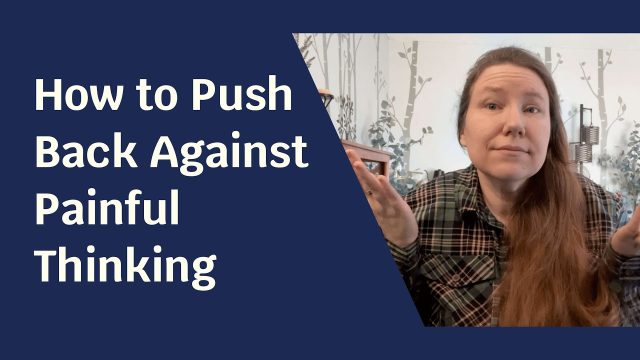
“Preparing” for discomfort
Here’s a long and drawn out story of a really tiny incident that I think will help to illustrate how dismantling our internalized, painful thoughts can free up a lot of space and give us back energy.
So, last night I was lying in bed and my sweater was bunched up against my neck. I don’t like things touching my throat and I had the impulse to reach up and pull the collar down a bit. Immediately that impulse was overwritten with, “no I can’t do that. It’s not worth it.” But instead of just going along with that, I got curious; asking myself, why isn’t it worth it? Why can’t I do that?
The answer that popped into my head was, I shouldn’t do it because I need to get used to being uncomfortable; because the world is uncomfortable. Immediately following that, I had another thought that was similar but not quite the same, telling me I need to be prepared for the harsh realities of life. I stayed in that curious observer mode and noticed how interesting those thoughts were. Then I asked myself if they’re true.
So the one thought was that I need to be prepared for the harsh realities of life. Is that true? Genuinely, is that actually true? Well, no. I have experienced the harsh realities of life so many times. If I’m not prepared for it by now, being uncomfortable with my sweater bunched up against my neck isn’t going to help.
So no, I don’t need to prepare for the harsh realities of life. I’ve faced them over and over. And yes, there are others that I might have to deal with at some point. And I can face those when they come. Being uncomfortable in bed right now is not going to help me deal with whatever those might be.
There will be plenty of disappointments in life, but is being uncomfortable now actually preparing me for that?
The other thought was about getting used to disappointment. There are lots of disappointments in life. So it felt like that thought might be true. But I stayed in that curious observer headspace. Is it true that I need to deal with disappointment now because I need to get used to disappointments in life? Honestly, no. I have faced so many disappointments in life already, I don’t need to get used to them. I’ve already faced them. I am used to them.
And I know that I can survive them. The part of the thought that is true is that yes, there will be plenty of disappointments in life, but is being uncomfortable now actually preparing me for that? No. Not really.
What’s actually helpful
And that line of thinking has never really done anything to help me “prepare.” So, what has helped? Sadly, when I was a kid or as a young adult, I don’t think I got much useful info or modeling from others on how to deal with disappointments in healthy ways.
I just faced them and coped as best as I could. And those weren’t always in the healthiest of ways.
In the last several years, I’ve learned a lot better ways to cope. But not by simply facing disappointments in raw form and hoping that I’d get better at dealing with others. So no, that thought really isn’t true either.
So lying there in bed, with my sweater bunched up against my neck, is not going to help me deal with disappointments or prepare for the harsh realities of the world. Rather, being uncomfortable and fighting that discomfort was drawing energy away from fully relaxing. And that was verifiably true: I wasn’t drifting off to sleep; I was fighting my own sensory system.
And if I were more comfortable, I might get better sleep so that my brain and body would function slightly better and have the energy and patience to be able to deal with the real disappointments in the world.
And so, the tiny result of this extended story is that I reached up and pulled the neckline of my sweater down a bit, and did that a few more times as I readjusted a few other things as I started noticing that I was uncomfortable in other ways, and wanted to fix those as well. It was much easier to relax then, not only because of my physical comfort, but because those thoughts weren’t spinning around in my head.
It was much easier to relax then, not only because of my physical comfort, but because those thoughts weren’t spinning around in my head.
By the way, did you notice that those thoughts were in the third person, like, “she needs to be prepared for the harsh realities of the world”? I didn’t get into that last night. But that could be a whole other piece of thought work, like, whose voice was that? Who was it, who taught me that? Or where was that messaging coming from that I internalized? Because it wasn’t from myself. But that’s a whole different can of worms that I could, and have, and probably will again, get into.
Okay, so this was pretty easy for me to do last night because I’ve done this type of thought work so many times. And I have dealt with those same thoughts and variations of those thoughts many times. And yes, they still keep coming up in other ways, sometimes at surprising moments. And the more I engage with them in this way, the easier it becomes to start questioning them, recognizing that that’s just a thought, not some absolute truth.
And often those painful thoughts are not in fact true. They might be close enough to the truth that they feel true. They might be borrowing some element of truth. Like the idea that there are disappointments in life, yes, that is true. But is it true that I need to be uncomfortable every moment in order to prepare myself for some future harsh reality? Or is that thought simply creating more pain for me to deal with?
I hope that this has been helpful to illustrate what the kind of thought work that I talk about looks like in action. I find that it helps to relieve the pain of harmful messaging, and that frees up some of my cognitive energy. Doing that work helped me sleep a little bit better last night, and now I’m feeling decent today.




